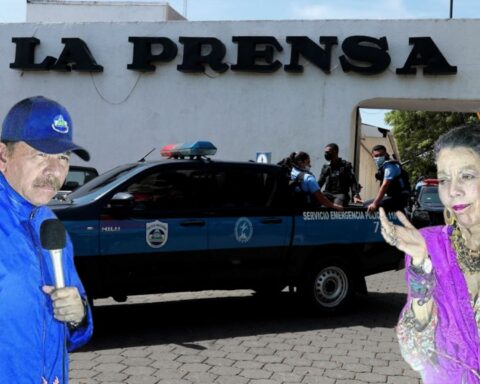Relatives of people arrested for political reasons during Holy Week in Nicaragua have expressed concern about not knowing their whereabouts, since they have not been formally charged nor is their location known.
Among the detainees there are activists, Catholic parishioners and a journalist who covered an event of the Catholic Church, but until Monday it was not known where these people were.
A relative of the journalist Victor Ticay, detained on Thursday, told the voice of america under the anonymity that they have not heard from the reporter for more than 80 hours and there is no accusation either.
As of Monday, the Nicaraguan authorities had not made any statements and no accusation has been made known.
The relatives of the Catholic parishioners Jimmy Bonilla and Enmanuel Gutierrez, arrested on Wednesday in the city of Nandaime, south of Managua, after having participated in a Church activity, also denounced on social networks that they do not know their whereabouts.
“We ask the authorities to give us information about our relatives and the reason for their detention,” they published in a message on Facebook.
Detainees should have been presented within 48 hours
Lawyer Yader Morazán, a former official of the Nicaraguan Judiciary told the VOA that within 48 hours of a person being arrested, they must be presented and there they could be accused, that is, they are made aware of the facts of which they are accused, a defense attorney is appointed and they are reviewed the precautionary measure that corresponds to the case.
Also, a judge, at the request of the Prosecutor’s Office, can argue that he does not have or that a case is being investigated that requires more time to expand the investigative evidence.
But in these cases, Morazán indicates that “what is striking is that the people who have been kidnapped are directly related to the exercise of religious freedom that is recognized in article 69 of our political Constitution and the police authorities are not authorities that can limit constitutional liberties”.
“The authorities have the obligation to guarantee, that is, they must be an extension, an arm to guarantee the rights already recognized in the Political Constitution, on the one hand. Disturbing religious acts, which is the case of many of these people who are linked to Christian activities during the Holy Week period, does constitute a crime called disturbing religious acts, which is typified and punished in article 190 of our penal code. In other words, the fact that a police officer is in uniform does not exempt him from responsibilities,” explained Morazán.
“The fact that a (Nicaraguan) police officer is in uniform does not exempt him from responsibilities”
Like other arrests in the country, Morazán says that these people are not told why they are being arrested, they do not have the right to lawyers, and they are not being brought before the judge within 48 hours.
According to the Blue and White Monitoring, published by opposition organizations, at least 71 incidents related to human rights violations occurred between April 1 and 9.
Of these incidents, 21 were “arbitrary” arrests related to parishioners “arrested for exercising their right to freedom of worship.” Most of the arrests, according to the report, occurred in the department of Masaya, followed by Managua.
The Vice President of Nicaragua, Rosario Murillo, in her traditional appearance in the official media, did not refer to the complaints from opposition organizations and said that Holy Week took place “in tranquility and security.”
Connect with the Voice of America! Subscribe to our channel Youtube and activate notifications, or follow us on social networks: Facebook, Twitter and Instagram.








